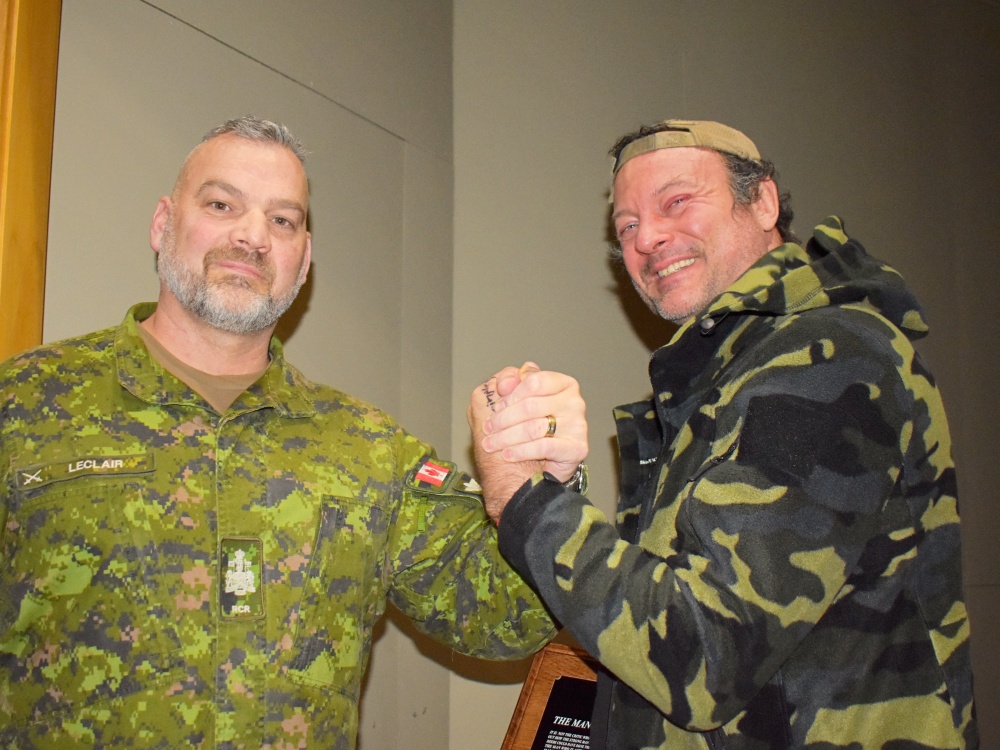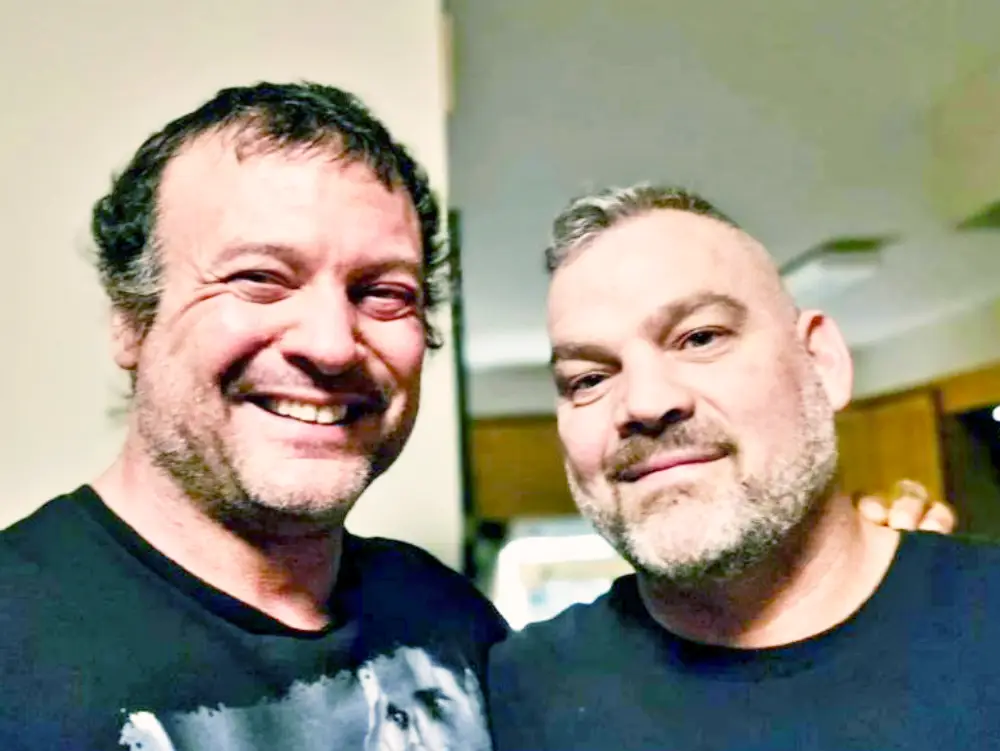
Chief Warrant Officer Eric Le Clair, Regimental Sergeant Major, greets his combat buddy Canadian World Champion Devon Larratt, in a friendly spar when the ex-JTF2 soldier visited CFB Shilo in December 2023. (Photo: K-J Millar/Shilo Stag News)
K-J Millar
Shilo Stag Special Feature
“Fear is going to speak to you … even when the chance of death is high, you have to keep pushing forward because standing still doesn’t change it.”
When world champion arm wrestler Devon Larrat spoke to Canadian Armed Forces (CAF) soldiers and civilian personnel at CFB Shilo in December, the retired Special Forces soldier didn’t mince words.
“The more physically fit you are, the more you will have as armour before the real bullets hit you. The real bullets eventually hit everyone,” Larratt said.
This is part two of a Shilo Stag News Special Feature. A link to part one is listed below.
More than 5,000 Canadian Armed Forces personnel will be deployed on overseas missions in 2024, starting with the first in March.
Talking about many crucial chambers of a soldier’s mindset, such as resiliency, simplicity, physical contact and war disposition, Larratt also spoke about the significance of spirituality while CAF soldiers complete what he called the “highest level of work.”
“You will inevitably be tested spiritually when you are on a mission because it is very difficult to do things when deep down you are not at peace with them.”
He said soldiers must believe in the mission’s objectives and be mentally fit. That’s where the shield of physicality and mental preparedness he previously mentioned circles back around.
“Because when the bullets start flying, and you know there is a chance you are going to die — if your “why” is not in line, it’s going to be very problematic for you to go out the door continually.”
Knowledge and a good understanding also help grow personal reconciliation and level out inner harmony with complex tasks.
“Educate yourself on the mission. Educate yourself on what you’re doing there and why you are doing it … You have to know why you are there.”
Inner peace needs fostering. He suggested that it can be found and nurtured in austere places like at home or on Base.
The Veteran said there is often little going on around some Bases, like where he was at Petawawa, and joked there is even less at CFB Shilo. He clarified when he was home from missions, he didn’t want anything “going on.”
“Right here at CFB Shilo, you can turn yourselves into a freakin’ machine … you can take the time to develop yourself physically, mentally and spiritually. This is what is going to make you resilient.”
“The peace and solitude you have [at home] is very valuable. In a place like Shilo, you can use it to become something much greater.”
The retired Joint Task Force 2 (JTF2) soldier believes that having these qualities and abilities makes a difference in missions.
“This is what is going to make you an effective soldier. This will get you and your team back home so that you will eventually be a Veteran and doing the second part of your life.”
The world champ admits he has made mistakes during his time on earth, and he likes to share them because people shared them with him as he was growing up.
“My whole life has been performance and fighting. My life revolves around it. It is my very deepest passion. Something I have learned about is failure.”
Larratt is open with his opinion that there is something wrong with Western culture’s romanticizing failure, like when athletes or soldiers train to fail or induce failure. He admits when he was a young soldier, he would push himself to fail in effort to improve.
“It can teach some incredibly valuable lessons. However, if you want to be the best you can be, over the course of time, it’s not good to fail.”
He said that as someone who has spent his whole life trying to be as good as he can be in performance, there is a “no pain, no gain” philosophy.
He believes practicing failure will set a soldier or athlete back in their journey.
“The reason why you can’t fail is because it takes too much time to get back from. It takes too much time, and it keeps you out of training. [It can be as] simple as you know, failing on an exercise, people think that’s a good thing. It’s not.”
One of the world title holders’ favourite topics to talk about is luck.
He concedes that luck is not something he understands; thus, not understanding it scares him.
“Luck is a very misunderstood thing – but a genuine thing. One that I am almost frightened to talk about.”
Referring to his time in JTF2, Canada’s most elite front-line combat unit, he explained if there is combat and Canada is involved, the group is there. The Special Force protects Canada’s national interests and combats terrorism and threats on home soil and abroad.
He said Canada has been involved in Iraq, Africa, Afghanistan and multiple theatres doing daily and weekly missions. According to the retired soldier, they have never lost a soldier in the 30 years since its 1993 inception.
“The number of missions that we’ve done, the number of times we’ve been shot is crazy. It’s going to happen. Of course, it’s going to happen. But the amount of perceived luck we have verges to me on a statistical impossibility. It makes me question many, many things.”
He has friends who were injured by shrapnel or shot. He has been shot.
“We’ve got guys skinning their heads with bullets. I’ve been shot a couple of times … We’ve been missed … Somehow, none of us have been killed yet.”
“The dice are rolled all the time. … for good or for bad.”
Larratt believes most of the time, the dice roll in the middle. He said, however, now and again, they can roll high or low.
“Your job is to be ready for luck because it is coming. Luck is coming, good or bad.”
It is a soldier’s job to set the conditions for their role and ensure they are in the right place and position, to make sure they are undercover, and to ensure they are vigilant, he said.
“People talk about luck like it’s magic. Luck is the same for everyone. It’s just, were you ready for when luck came?”
He believes that individuals can set the physical conditions, like body fitness, sleep, nutrition and family, to balance the scales in a more favourable position.
For the ex-Special Forces soldier, it’s his experience that one of the most important things for a soldier is the team around them.
“We’re all connected. We are all one thing. We’re a reflection of each other … by taking care of the person beside you, you are taking care of yourself. You are taking care of yourself when taking care of your family.”
When he was a kid starting Judo, he quickly learned that he didn’t need to be the “reserved, polite” youth he was raised to be. He learned to fight harder because it was acceptable behaviour in the sports environment. He learned to take on a different sportsmanship persona.
A sports mindset is an excellent place to grow. A war mindset is something different, he explained. The higher the level of competitive sport, the closer the ethos merges to a war demeanour.
“When I compete, I am a very mean person. I do it on purpose. It’s lessons I learned in the Special Forces,” he said, adding the war mindset dominates.
“I know how it breaks people down mentally. And in a war mindset, there is no sportsmanship. You are there to win … There is no fairness. There is no nicety. There is no room to let the guy back in. There’s no fair play. There is only victory.”
Soldiers need to allow themselves to develop this mindset and recognize that doing so is a good thing because it decreases the risks, increases success and helps bring the team members back home, he said.
In closing remarks at his presentation, he retold a story about the need to take risks and about one man’s decision to go against instinct.
The former JTF2 soldier said in 2005 while descending by helicopter on a nighttime mission with a “time-sensitive target,” his team was trapped in an insurgent town in Afghanistan.
“We got ambushed on our infill. We ended up [crashlanding] under fire right in the middle of [a valley] at the border of the desert and the mountains.”
He described the chaotic scene as under heavy fire; team members were wounded, communication radios were damaged and not working, and no one knew where anyone else was.
“All of our instincts are telling us to hide, to go behind rocks, to seek cover just to survive [and to defend ourselves].”
He said the truth was they were “massively outnumbered” by militants in the mountains who had been watching them and could see their every move.
“Many of our guys got hit that day, myself included. A lot of the native Force got killed. Then, a guy on our team made such an incredible decision.”
“He said we have to take this hill.”
Shaking his head, Larratt said the initial thoughts were, “Oh my God, this is extremely difficult.”
However, he knew such a decision speaks to risk and the understanding that everything has liability and peril.
“Sometimes fear is going to speak to you. Fear is going to tell you to hide and seek shelter,” he said, clarifying that can be the wrong decision.
Staying in the valley was not an option. The Force would have been killed off one by one, he said.
“At times, even when the chance of death is high, you have to keep pushing forward because by standing still, it doesn’t change. It just extends the time when you are inevitably going to have to do it anyway.”
“We had to leave that place … We ended up taking the hill.”
He credits the Air Force with having their backs and coming to assist with the AC Scepter/Spooky Gunship by “hounding” the insurgents for the next three days.
“Risk is super important to grab hold of. Sometimes, you are faced with two terrible decisions. You have to make one and just go for it. That’s one thing that inspires me all the time.”
In closing, the world champion arm wrestler’s final words to the soldiers and staff at CFB Shilo were,
“You’re doing a job that is revered by Canadians. You’re doing a job that is selfless, and speaks to service. You should all be very proud of that.”

Chief Warrant Officer Eric Le Clair, Regimental Sergeant Major, and Canadian World Champion Devon Larratt, who were previously combat buddies met up when the ex-JTF2 soldier visited CFB Shilo in December 2023. (Photo: K-J Millar/Shilo Stag News)

